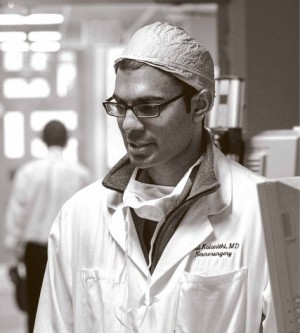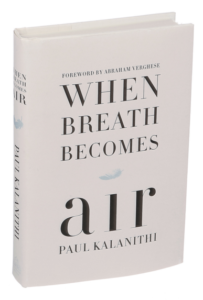 Dr. Paul Kalanithi at the Stanford Hospital and Clinics in 2014.
Dr. Paul Kalanithi at the Stanford Hospital and Clinics in 2014.
(Norbert von der Groeben/Stanford Hospital and Clinics)
Thirty-six-year-old Paul was close to completing his arduous journey to becoming a full-fledged neurosurgeon. He already had earned two undergraduate degrees and a master’s degree in English Literature. He was married to a beautiful, smart and caring woman, also a doctor, whom he met when they were both first year medical students. He had a loving family, and a world of wonderful friends, not to mention a sublime sense of humor. He had packed a great deal into his years, but he no doubt had an exciting life ahead of him!
Then, Paul began losing weight and experiencing ferocious back pain. He attributed his symptoms to the stress of his medical residency. After all, he was working 80-hour weeks and was on his feet for brain operations that could last for 36 hours. He was young. He was not thinking about cancer.
But when his symptoms didn’t abate, and he developed severe chest pain and a persistent cough, and his weight began dropping more rapidly, Paul had tests, and received a diagnosis that would rob him of the future he had imagined. Paul had advanced lung cancer, extremely rare for someone so young, and he would likely die at an age most people would still call ‘young’.
Dr. Paul Kalanithi didn’t spend the time left to him (a little less than two years) dying. He spent it learning how to die, and he chronicles what he learned in When Breath Becomes Air, a book that should be required reading for anyone over the age of 18. Janet Maslin’s review in The New York Times says it better than I ever could:
“I guarantee that finishing this book and then forgetting about it is simply not an option. There is so much here that lingers, and not just about matters of life and death: One of the most poignant things about Dr. Kalanithi’s story is that he had postponed learning how to live while pursuing his career in neurosurgery. By the time he was ready to enjoy a life outside the operating room, what he needed to learn was how to die.”
 Paul’s powerful writing takes you inside his brain. You look through his eyes at his CT scans, hear through his ears when his wife, Lucy, asks him: “What are you most afraid or sad about?” and touch through his fingers when he holds his newborn daughter, Cady. And, when a “piercing nausea” strikes him as he is dressing for graduation–“the culmination of seven years of residency”–and he begins “uncontrollably vomiting green bile,” from “deep in my gut,” you feel it in your gut, too.
Paul’s powerful writing takes you inside his brain. You look through his eyes at his CT scans, hear through his ears when his wife, Lucy, asks him: “What are you most afraid or sad about?” and touch through his fingers when he holds his newborn daughter, Cady. And, when a “piercing nausea” strikes him as he is dressing for graduation–“the culmination of seven years of residency”–and he begins “uncontrollably vomiting green bile,” from “deep in my gut,” you feel it in your gut, too.
You ask yourself if you could possibly look at your own impending death as bravely as Paul looked at his. If you could will yourself to a job you loved. If you could decide to have a child who would never know you. If you could evaluate the meaning of your own life, as it was about to end.
And, when you finish reading When Breath Becomes Air, you think that Paul Kalanithi is more alive in death than many of us are in life. It is unnerving, but you’re grateful that Paul has taught you the greatest lesson about life you will ever learn.

